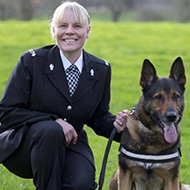
The Thin Blue Paw Foundation appeals for donations to support its vital work.
People who take on retired police dogs may be left with no choice but to give up their pets due to 'alarming soaring costs', a national charity has warned.
The Thin Blue Paw Foundation reports that soaring living costs are having a significant impact on families with pets, and “owners are beginning to fret about how they'll continue to care for their beloved animals.”
As many animal charities report increases in relinquishment and abandonment, the charity said: “We’re particularly concerned about how the cost of living crisis might affect police dog handlers, police staff and members of the public who adopt former police dogs when they retire from service.”
It added that people also need to consider that it is almost impossible to insure ex-police dogs and that many of these dogs “have serious and expensive medical conditions as a result of their strenuous working lives.”
Research by the PDSA found that it can cost in excess of £85 a month to care for a large breed of dog, such as a German Shepherd, Belgian Malinois or Labrador - three of the most popular breeds for use as general purpose and detection dogs.
The Thin Blue Paw Foundation was formed to help owners who adopt retired police dogs manage these costs. The charity, which has 300 ex-police dogs registered, provides financial support to help owners pay for monthly therapy, regular medication, and one-off treatment and surgery.
Trustee Kieran Stanbridge is appealing to the public to help ensure the country’s retired canine heroes have access to medication, therapy and life-saving treatment when they need it.
He said: “We set up the charity to ensure that these unsung heroes could access the very best in veterinary care to ensure that they could have long, happy retirements and would get pioneering treatment and medication to manage conditions and injuries which, so often, are due to the hard life they’ve led working to fight crime and keep the public safe.
“It’s the least we can do after all these incredible dogs have done for us and our communities. And it’s more important now than ever. We would hate to hear that an owner may be left with a heartbreaking decision on having to give up their beloved dog or even consider euthanasia because they can’t afford the treatment they need to have a good quality of life."
He continued: “We’d appeal to the public to help us continue our vital work to provide the lifeline that these dogs deserve after everything they’ve done for us. We know times are hard, but if you can afford to make a one-off donation or sign up as a regular donor, then we’d be hugely grateful.”
Donations can be made at https://donate.thinbluepaw.org.uk
Image (C) Thin Blue Paw Foundation.



 Zoetis is to present a CPD event for free to members of the British Veterinary Nursing Association (BVNA).
Zoetis is to present a CPD event for free to members of the British Veterinary Nursing Association (BVNA).